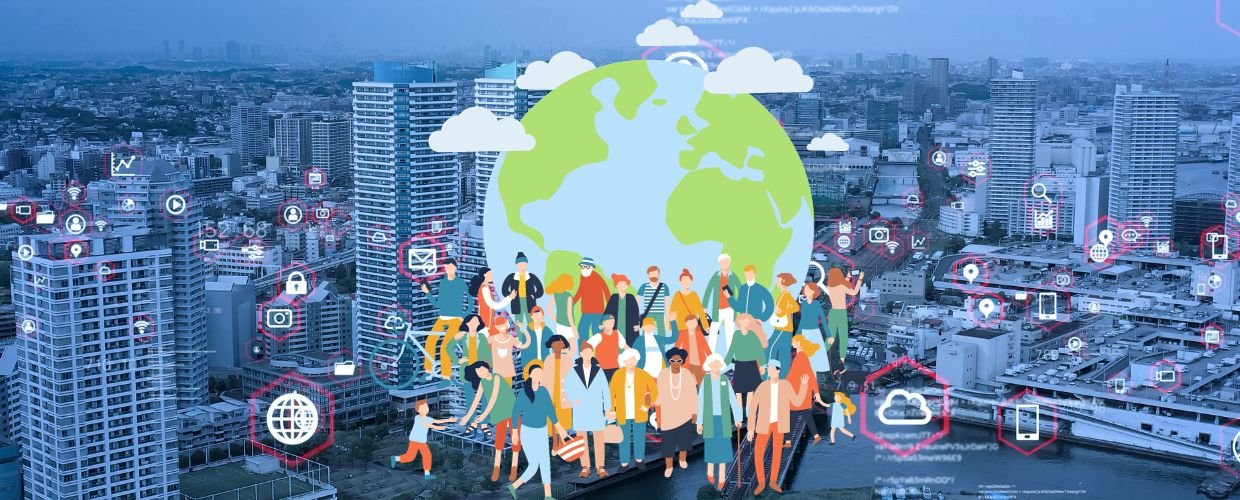The concept of a digital society has rapidly evolved from science fiction to an intricate reality. With technological advancements reshaping every facet of our lives, understanding the dynamics of a digital society has become essential. As we embrace this paradigm shift, exploring the opportunities, challenges, and implications of a world deeply entrenched in digital connectivity is crucial.
Digital Connectivity Redefined: Unveiling the Fabric of a Digital Society
A digital society is one where connectivity extends beyond personal interactions, integrating technology into the very fabric of daily life. From smart cities and wearable devices to internet-enabled infrastructure, the digital society weaves technology into every aspect of human existence.
Smart Cities: Transforming Urban Landscapes
Smart cities leverage technology to enhance efficiency, sustainability, and quality of life. Smart cities optimize resource utilization, reduce congestion, and improve citizen services through interconnected systems, data-driven insights, and automation, redefining urban living for a tech-savvy populace.
Internet of Things (IoT) and Wearables: Empowering Individuals
The proliferation of IoT devices and wearables has created a hyperconnected environment where individuals are continuously linked to digital networks. These devices, from fitness trackers to smart home assistants, empower users with personalized insights, convenience, and real-time access to information and services.
Social Transformation in the Digital Age: Impacts and Considerations
The digital society revolutionizes how people interact, communicate, and participate in civic life, presenting opportunities and challenges.
Global Connectivity: Bridging Geographic Divides
Digital connectivity transcends geographical boundaries, enabling instant communication and information sharing across continents. It fosters cross-cultural understanding, accelerates knowledge dissemination, and offers platforms for collaboration that have the potential to drive global progress.
Digital Inclusion and Accessibility: Ensuring Equal Participation
As society becomes increasingly digital, addressing the digital divide becomes imperative. Ensuring equal access to technology and digital resources is essential to prevent marginalized populations from being left behind and ensure everyone can benefit from the opportunities it presents.
Ethics and Privacy in the Digital Era: Navigating Uncharted Waters
As digital society advances, ethical concerns and privacy considerations come to the forefront, demanding careful navigation.
Data Privacy and Security: Safeguarding Personal Information
With a digital society comes an influx of data sharing, raising concerns about privacy breaches and misuse of personal information. Robust data protection measures, stringent privacy regulations, and enhanced cybersecurity are vital to preserve individuals’ rights and trust in digital systems.
Ethical AI and Algorithmic Accountability: Balancing Innovation and Responsibility
The integration of AI in a digital society necessitates ethical considerations. It is essential to ensure that AI systems make unbiased decisions, protect human rights, and are transparent in their operations. Algorithmic accountability frameworks are needed to address biases and mitigate potential adverse impacts.
Shaping the Future: Pathways to a Thriving Digital Society
The trajectory of the digital society holds the potential to reshape human interactions, industries, and governance structures.
Digital Education and Lifelong Learning: Equipping the Workforce
It requires a workforce equipped with digital literacy and adaptable skills. Education must evolve to provide lifelong learning opportunities that empower individuals to navigate the complexities of a tech-driven world and participate actively in digital initiatives.
Sustainable Digitalization: Balancing Progress and Environmental Impact
Striking a balance between technological advancement and environmental sustainability is crucial. A responsible digital society considers the ecological footprint of digital infrastructure and technologies, striving for innovations that minimize environmental impact while driving positive change.
Conclusion
The digital society represents an era of unparalleled connectivity, transformative potential, and uncharted challenges. As we venture into this uncharted territory, embracing technology’s potential is vital while remaining vigilant about its ethical, privacy, and social implications.
By fostering digital inclusion, upholding data ethics, and prioritizing sustainability, we can shape a digital society that uplifts individuals, advances humanity, and paves the way for a future where technology is a tool for positive change. As we navigate the complexities of this digital frontier, it’s our collective responsibility to ensure that the digital society is a force for progress, inclusivity, and empowerment.




